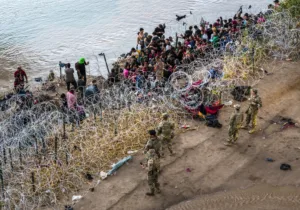Another crisis with migrants is unfolding as authoritarian Belorussia is transporting Mideast and Asian migrants to the border of Poland, which has deployed 12,000 troops to prevent unauthorized entry. Lithuania and Latvia also say Belorussia is routing migrants towards them.
Oxford Christian ethicist and Church of England cleric Nigel Biggar (and Providence contributor) recently offered spiritual insights on mass migration in a sermon at Christ Church Cathedral in Oxford. He cited the recent murder of British parliamentarian David Amess by a Somali immigrant within the context of other murders by radical Islamist migrants. “The task of integrating people from very foreign cultures into the values and norms of contemporary Britain is not an easy one,” Biggar noted.
Biggar offered points for Christians on immigration policy:
- Don’t immediately dismiss concerns about migration as racist;
- Admit care should extend beyond accepting political refugees to addressing the conditions that impel migrants to take the risk of leaving their own countries in the first place; •
- Return illegal economic migrants whence they came;
- Recognize that compassion should extend beyond migrants to the poor of our own country, and even those to whom we have outsourced the hard decisions;
- Christians are called to extend not just compassion but also justice to all parties with prudence.
Biggar said immigration “can be a benefit, enriching the receiving country culturally and populating its workforce with industrious and enterprising workers.” But it also “may strain social cohesion, trust, and solidarity by perpetuating cultural customs that are not merely foreign to natives, but morally objectionable—such as the degradation of women, forced marriage, honour killing, and the incitement of violence against infidels.”
Some societies collapse under the pressure of mass immigration, as when Europeans immigrated to North America and Australia in the 18th and 19th centuries, overwhelming and sometimes destroying native peoples, Biggar said. Mass immigration can also “strip the sending society of much of its talent,” he said, noting about 40% of all Syrians with university degrees were resident in Germany in 2018.
Biggar warned that mass immigration offers middle-class Christians cheap labor but increases job competition for working class natives. For Christians, caring for aliens should entail “providing asylum for those suffering political persecution, and maybe those fleeing war and failed states, too.” And it should involve “investing in the stability and prosperity of poor, unstable countries.”
Illegal economic migrants should be returned home, Biggar said, otherwise additional waves will be encouraged to migrate, nullifying national borders. Governments “have a primary duty of care towards its own people and their legitimate interests,” he said, which include “upholding the rule of law, maintaining the confidence and compliance of law-abiding citizens, and protecting social cohesion, trust, and solidarity.” These qualities in a nation are what attracts migrants, he noted.
Biggar quoted Reinhold Niebuhr about concern for “the burden-bearers of the world,” persons in government “to whom we have outsourced the onerous responsibility of making hard decisions on our behalf.” And he quoted Martin Luther that “God’s love—and so ours—must operate with its left hand,” as “sometimes justice and prudence ought to qualify compassion in requiring difficult decisions that knowingly cause other people distress.”






